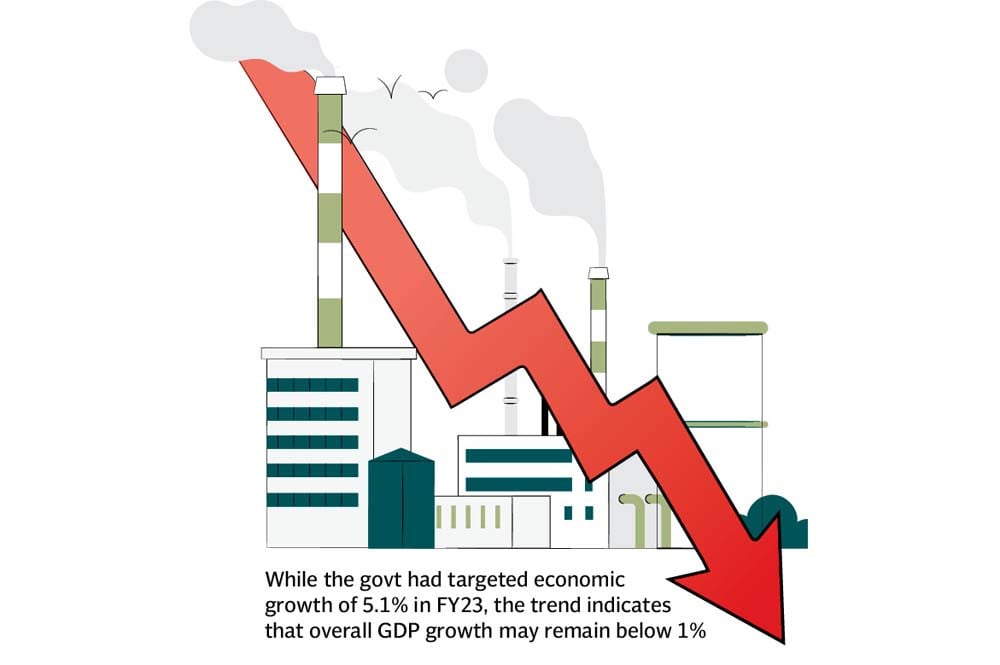.,.,.,.
Big industries contract by 12% in February
Reeling from supply-chain disruptions, high costs, economic slowdown
Shahbaz Rana
April 18, 2023
The pace of contraction in Pakistan’s major industries sharpened to nearly 12% in February over a year ago, as the industries reel under pressure from supply-chain disruptions, high fuel costs, policy uncertainty and an economic slowdown.
Large-Scale Manufacturing (LSM) industries recorded an 11.6% lower production rate in February over a year ago, the Pakistan Bureau of Statistics (PBS) said on Monday. The contraction was steeper than the market expectations but is in line with the expectation of overall negative growth in the industrial sector during the current fiscal year.
Pakistan’s factories are shutting down one after another because of restrictions imposed on imports that have caused a shortage of imported raw material. The steep currency devaluation has also made raw material expensive and business models unviable.
Dwindling foreign exchange reserves, standing at only $4 billion, administrative import controls, flood-related supply-chain disruptions, high fuel costs, policy uncertainty, and the slowdown in domestic and global demand have affected the industry and service sector activity, according to a recent report by the World Bank.
The World Bank has projected negative growth in both industrial and agriculture sectors during the current fiscal year with overall Gross Domestic Product (GDP) growth rate at only 0.4%. Business and consumer confidence have continued to plummet, suggesting continued suppressed activity over the coming months.
The government is allowing imports equal to monthly inflows on account of exports and remittances – a strategy that has proven too costly for industries. The government has compressed imports to a range between $2 billion and $2.5 billion per month, causing supply shortages.
“Our foreign exchange position is very tight and we are giving preference to the import of food and medicines,” said Prime Minister Shehbaz Sharif while speaking on the floor of the National Assembly on Monday.
The government has been waiting for the International Monetary Fund (IMF) deal to materialise before it starts normalising imports.
Earlier this month, the central bank also increased its interest rates to 21% – the highest in Pakistan’s history – in hopes of cinching a staff level agreement with the IMF. Still, there is uncertainty, as the lender had initially demanded around 7% increase in the interest rates.
The LSM trend indicates that this year the overall GDP growth rate may remain below 1% due to the shutdown of industries and adverse impact of the devastating floods on the agriculture sector, according to estimates from the finance ministry, IMF, World Bank and Asian Development Bank. The government had targeted economic growth of 5.1% in the current fiscal year.
Overall, LSM output shrank 5.6% in the July-February period of fiscal year 2022-23, the PBS reported.
The big industries faced broad-based contraction, with 18 of the 22 sectors witnessing lower production during the first eight months (July-February) compared to a year ago. Only clothing, leather products, furniture, and other manufacturing sectors saw an increase in production during the first eight months.
Since large industries contribute heavily to revenue collection and job creation, any change in their growth impacts the government and business sentiment across the board. The LSM sector contributes nearly one-tenth to total national output, however, a constant decline in the share and growth of LSM may cause a lot of problems for the government already struggling to create new jobs.
The main contributors towards overall the negative growth of 5.6% include the food sector that shrank by 2% and the tobacco industry which contracted by one-fifth. Similarly, the textile sector’s output also dropped by over 14%. Petroleum products and cement production also dipped significantly during the first eight months of the fiscal year.
The two sectors hit hardest by the ban on imports were pharmaceuticals and automobiles, both of which witnessed significant contraction during the first eight months of the current fiscal year.
Production was also lower in the chemicals sector, non-metallic mineral products, machinery and equipment and transport equipment.








